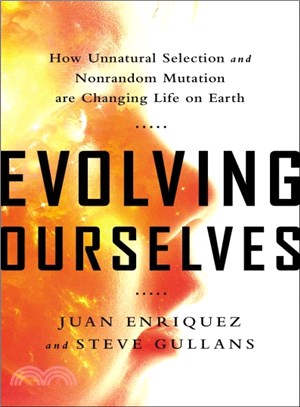目前查詢
歷史查詢

Evolving ourselves :how unnatural selection and nonrandom mutation are changing life on earth /
- 館藏(1)
- 書目資訊
- 心得(0)
- 機讀格式
- 標籤
書名 : Evolving ourselves :how unnatural selection and nonrandom mutation are changing life on earth /
紀錄類型 : 書目-語言資料,印刷品: 單行本
正題名[資料類型標示]/作者 : Evolving ourselves :Juan Enriquez and Steve Gullans.
其他題名 : how unnatural selection and nonrandom mutation are changing life on earth /
其他題名 : How unnatural selection and nonrandom mutation are changing life on earth.
作者 : Enriquez, Juan,
其他作者 : Gullans, Steve.
出版者 : New York, New York :Current :[2015].
面頁冊數 : ix, 371 p. ;24 cm.
內容註 : What would Darwin write today? -- Symptoms of real-time evolution -- How does evolution really work now? -- A world of nonrandom mutation -- Evolving ourselves... -- The future of life -- Epilogue.
標題 : Human evolution.
ISBN : 9781617230202 (hbk.) :
發表心得
LEADER 03138cam a2200289 a 4500
001 80760
003 TNML
005 20151028190312.0
008 180319s2015 nyu e 000 0 eng d
020 $a9781617230202 (hbk.) :$cNT907$
035 $aNO000070339
035 $a854795
037 $a公共圖書館臺南分區資源中心
040 $aNLM$beng$erda$cNLM$dYDXCP$dDLC$dBTCTA$dBDX$dBIB$dOI6$dJP3$dTWTNM
050 4$aGN281$b.E57 2015
060 00$a2015 C-861
060 10$aGN 281
082 0 $a599.938$222
090 $a臺南市立圖書館
100 1 $aEnriquez, Juan,$d1959-
245 10$aEvolving ourselves :$bhow unnatural selection and nonrandom mutation are changing life on earth /$cJuan Enriquez and Steve Gullans.
246 1 $aHow unnatural selection and nonrandom mutation are changing life on earth.
260 $aNew York, New York :$bCurrent :$c[2015].$bPublished by the Penguin Group,
300 $aix, 371 p. ;$c24 cm.
504 $aIncludes bibliographical references (p. 285-352) and index.
505 0 $aWhat would Darwin write today? -- Symptoms of real-time evolution -- How does evolution really work now? -- A world of nonrandom mutation -- Evolving ourselves... -- The future of life -- Epilogue.
520 $aIn Evolving Ourselves, futurist Juan Enriquez and scientist Steve Gullans conduct a sweeping tour of how humans are changing the course of evolution--sometimes intentionally, sometimes not. For example: Globally, rates of obesity in humans nearly doubled between 1980 and 2014. What's more, there's evidence that other species, from pasture-fed horses to lab animals to house cats, are also getting fatter. As reported by U.S. government agencies, the rate of autism rose by 131 percent from 2001 to 2010, an increase that cannot be attributed simply to increases in diagnosis rates. Three hundred years ago, almost no one with a serious nut allergy lived long enough to reproduce. Today, despite an environment in which food allergies have increased by 50 percent in just over a decade, 17 million Americans who suffer from food allergies survive, thrive, and pass their genes and behaviors on to the next generation. In the pre-Twinkie era, early humans had quite healthy mouths. As we began cooking, bathing, and using antibiotics, the bacteria in our bodies changed dramatically and became far less diverse. Today the consequences are evident not only in our teeth but throughout our bodies and minds.
520 $aThough these harbingers of change are deeply unsettling, the authors argue that we are also in an epoch of tremendous opportunity. New advances in biotechnology help us mitigate the cruel forces of natural selection, from saving prematurely born babies to gene therapies for sickle cell anemia and other conditions. As technology enables us to take control of our genes, we will be able to alter our own species and many others--a good thing, given that our eventual survival will require space travel and colonization, enabled by a fundamental redesign of our bodies. Future humans could become great caretakers of the planet, as well as a more diverse, more resilient, gentler, and more intelligent species--but only if we make the right choices now.
650 0$aHuman evolution.
650 0$aNatural selection.
653 $a知識性
700 1 $aGullans, Steve.
